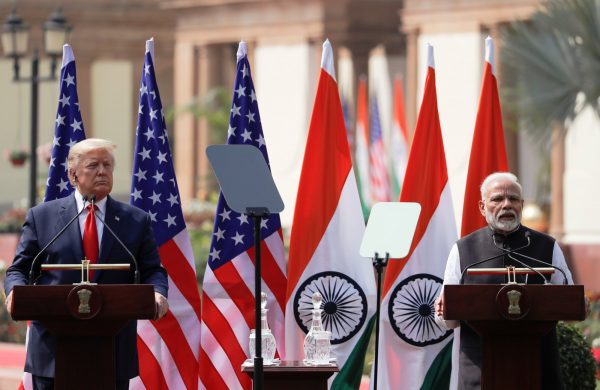Even as India’s view of China hardens, this is not a repeat of the Cold War, with a zero-sum contest for other states’ fealty. Many states are engaged in strategic competition with China — each in their own way — but there is no grand coalition headquartered in Washington.
The collection of China’s competitors is fuzzy and fluid, extending beyond the US alliance system. It is defined more by suspicions of China than conformity with the US brand of ‘great power competition’. It features states with varying degrees of engagement with China; most depend on China for economic prosperity, including Australia and the United States. It also spans varying degrees of vulnerability to China. While Australian agriculture and service exports can be held hostage by Beijing, India faces a constant military threat to its sovereignty.
And it accommodates varying degrees of defiance of China. A few will sail warships through the South China Sea, others may equivocate on granting China access to their critical telecommunications infrastructure, and others may be skittish about condemning Chinese human rights abuses against Uyghurs.
This variance in approaches to China is matched by variance in policy alignment with the United States. Even close US allies, like the United Kingdom and South Korea, may not agree with Washington on how to deal with China. Today’s strategic competition is less clear and coherent — but maybe also more flexible and resilient — than the old Cold War hub-and-spoke US alliance system.
The United States itself is hardly a fully committed competitor. It came late — compared to regional states living under China’s shadow — to the realisation that strategic competition was underway. It also failed to arrest China from building and militarising a foothold in the South China Sea. It walked away from opportunities, like the Trans-Pacific Partnership, to institutionalise its leadership in the region, reneged on deals that it had cajoled others to join and routinely deprioritises regional diplomacy. Its President regularly abuses its closest allies.
In this loose collective of China’s competitors, India is a founding member. After their 1962 War, India–China relations only normalised in the late 1980s. Beyond the simmering border dispute and lopsided trading relationship, India is anxious that China enables Pakistan’s military posture against India and contests Indian influence among other South Asian and Indian Ocean states.
Still, India has traditionally avoided public declarations of picking a side. This was to maintain its ‘strategic autonomy’ and because the unrealised threat of moving closer to the United States was valuable leverage over China. But the historical conceit of a nonaligned India has become impossible to sustain. India’s intent to compete more aggressively with China is clear. Most of its recent military growth, and Prime Minister Narendra Modi’s energetic regional diplomacy, is designed with China in mind. Even the current border crisis was triggered in large part by India’s attempts to toughen its military posture on the frontier.
Externally, India’s most important partnerships are also an artefact of its strategic competition with China. In the past two decades, India has transformed its relationship with the United States, with a raft of new arms acquisitions, defence agreements, military exercises and high-level consultations. New Delhi has deepened security cooperation with other actors — including Japan, Australia and France — without US leadership or involvement. Indeed, Washington was absent in some of the boldest acts of strategic competition with China, from Africa to the South Pacific.
The current border crisis will not reorient Indian policy towards a US alliance, but it may rebalance some of its priorities. New Delhi had long ago committed to competing with China. But India’s counter-balancing actions often appear anaemic because its defence strategy is muddled — a relic of outmoded views on how to best manage competition with China. The Indian military misallocates its limited resources because of obsolete threat perceptions. And Pakistan-based terrorism still captures public and political attention more than a slow-burning strategic competition with China. The border crisis may move the needle on those fronts. India’s decisions to increase its military presence in the Indian Ocean and probably to invite Australia to the Malabar naval exercises may be early indications of an overdue strategic adjustment.
The real import of the border crisis is not in pushing India towards a US alliance, but in potentially energising how India pursues its strategic competition with China. The US partnership is necessary and profitable, but an alliance is implausible and could not paper over India’s strategic muddle. If the crisis and its casualties prompt a rigorous review of the trade-offs and commitments necessary to compete effectively, it may prove to be a relatively cheap lesson for India.
Arzan Tarapore is a non-resident fellow at the National Bureau of Asian Research in Washington, DC, and will join Stanford University in September as a Research Scholar on South Asia.


Much like the Kashmir issue, India will not overly invite the US into the conflict with China. In fact, Trump wanted to come in but both India and China went to Russia, after which Indian NSA had a chance with deescalation strategy.
As far as Japan and France are concerned, it’s a ‘middle powers’ game which can be trusted to stick together against aggression, unlike the suspicion on US commitments